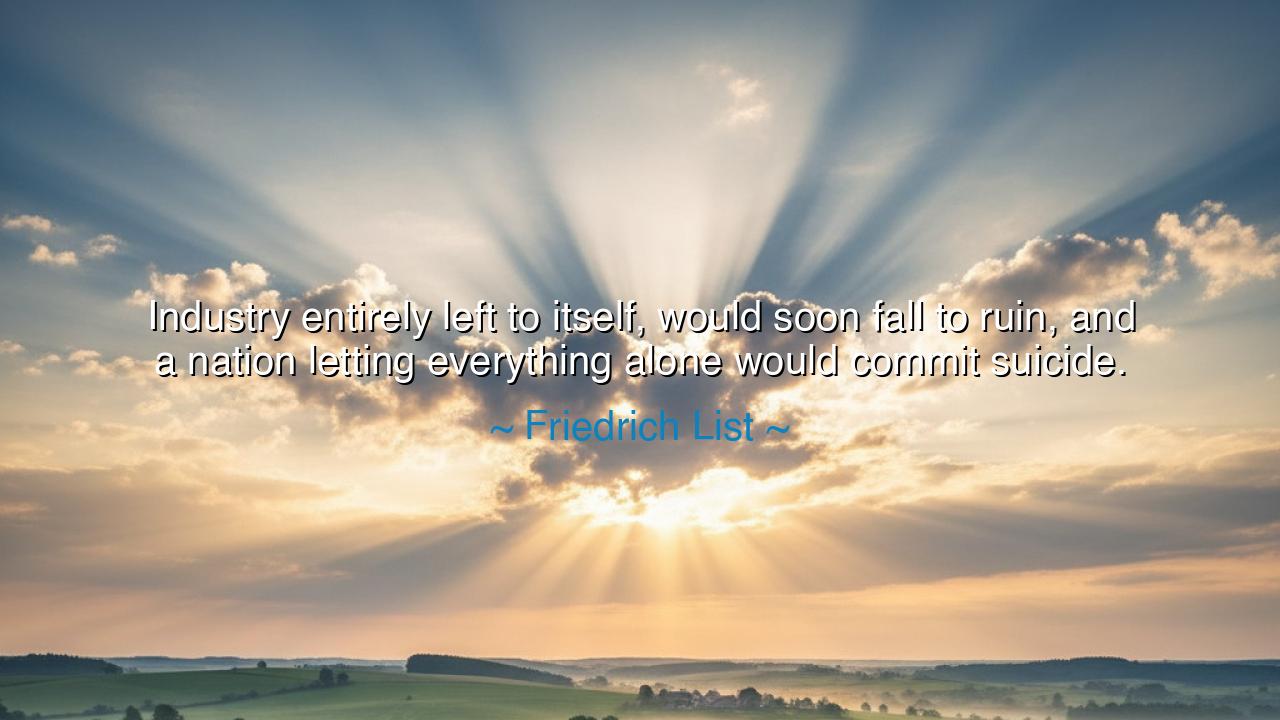
Industry entirely left to itself, would soon fall to ruin, and a
Industry entirely left to itself, would soon fall to ruin, and a nation letting everything alone would commit suicide.






The words of Friedrich List — “Industry entirely left to itself, would soon fall to ruin, and a nation letting everything alone would commit suicide.” — sound like a warning written in fire upon the walls of civilization. In these words, List, the German economist and visionary, speaks not only of the economy, but of the soul of nations. He declares that prosperity is not born from neglect, and that freedom without guidance is not liberty, but decay. For just as a garden left untended becomes a wilderness, so too does an economy left wholly to chance turn against itself. Industry, he teaches, is a living thing — it thrives under care, wisdom, and protection, but perishes when abandoned to the cold winds of indifference.
The origin of this truth lies in the turbulent age in which List lived — the early 19th century, when nations were struggling to define the balance between freedom and structure, between private enterprise and public duty. The doctrines of laissez-faire economics had swept through Europe, teaching that government interference was the enemy of progress. But List, observing the poverty of his homeland and the rising might of Britain, saw a deeper reality: that a nation’s greatness does not arise from the freedom of the strong alone, but from the cultivation of all its people, from the building of its industries, roads, and education. He looked to America, where protection and planning had nurtured growth, and he warned that to “let everything alone” was not wisdom — it was national suicide.
In his vision, List understood that economic life is a balance between liberty and stewardship. A nation that worships profit but forgets purpose is like a ship without a captain — swift for a moment, but doomed to drift into the rocks. He believed that governments have a sacred duty: to foster innovation, protect the weak from exploitation, and invest in the long-term health of their people. Industry is the forge of a nation’s destiny; it must be shaped with care, not abandoned to chaos. For when the powerful are left unchecked, greed devours justice, and the engines of progress turn against the very society that built them.
The history of nations proves his words again and again. Look to Rome, mighty and invincible, whose vast wealth flowed freely across its empire. Yet in time, it forgot to cultivate its own soil, to strengthen the hearts of its citizens, to guard the foundations of its prosperity. It left its economy to merchants and mercenaries, its farms to decay, and its people to idleness. In the end, Rome did not fall to enemies from without, but to neglect from within — it let everything alone, and so it committed suicide. In modern times, too, nations that worship the invisible hand without the guiding hand of wisdom find their societies hollowed out, their wealth uneven, their people restless. List’s warning is no less urgent today than when he first uttered it.
His words also reveal a deeper law of life — one that applies not only to nations, but to every soul. For what is true of industry is true of the human spirit: if left to itself without discipline, without cultivation, it falls to ruin. A person who lets everything alone — who does not train the mind, nurture the virtues, or guide the passions — commits a kind of spiritual suicide. Freedom is not the absence of order; it is the mastery of one’s own power. The same flame that warms can also destroy if not tended. List’s teaching, though born of economics, is in truth a philosophy of responsibility — a call to care for what we build, lest our creations turn against us.
There is a living example of this in the story of Japan’s Meiji Restoration. In the 19th century, Japan stood isolated and stagnant, content to let the world pass by. But when it saw the growing might of industrial nations, it acted with vision. The leaders of Japan understood that to let everything alone was death, and so they guided their people through transformation — building factories, schools, railways, and armies. Within a generation, Japan rose from isolation to power, proving List’s wisdom: when a nation takes responsibility for its destiny, it thrives; when it abdicates that duty, it dies.
The lesson, then, is clear and enduring: neither nations nor individuals can survive by neglect. Freedom must be guided by purpose; prosperity must be guarded by wisdom. To “let everything alone” is to abandon the duty of care, to surrender the future to chance. Whether one governs a country, leads a business, or steers one’s own life, the principle remains the same — nurture what you have built, guide it with foresight, protect it with justice.
So, O seeker of understanding, remember the wisdom of Friedrich List: industry left alone will fall to ruin, and a nation that lets everything alone will commit suicide. In all things, balance liberty with stewardship, ambition with conscience, progress with compassion. For the world, like the soul, thrives not in neglect but in nurture — not in blind freedom, but in enlightened care. Tend your garden, guide your nation, and shape your destiny with purpose, lest the harvest of neglect bring not abundance, but decay.






AAdministratorAdministrator
Welcome, honored guests. Please leave a comment, we will respond soon